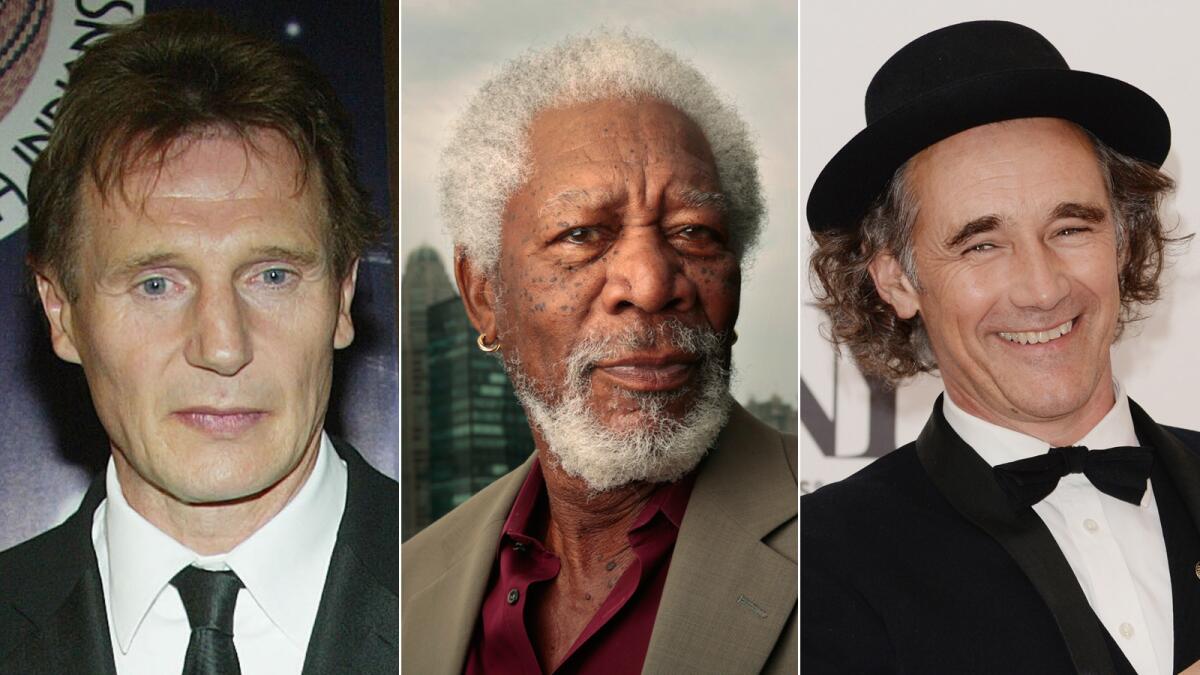Searching for the next King Lear: A critic shares his casting notes

- Share via
In my recent critic’s notebook on the Shakespeare in the Park production of “King Lear” with John Lithgow, I listed the illustrious actors I’ve seen take on this fearsome role in the last 10 years.
Who would I like to see assume the challenge in the next 10?
For a long time my answer to the question, “Who should play Lear?” was assured: Morgan Freeman. But I can’t see Freeman putting himself through the wringer for a stage production at this point in his career, though perhaps he could be persuaded to show us his Lear if the right movie director came along with studio backing. (A critic can dream, no?)
Now that he has passed the fourscore mark, Alan Mandell shouldn’t be asked to perform this marathon eight times a week, but how about a staged reading for a Center Theatre Group or Geffen Playhouse benefit evening? His laser intelligence would renew the play even for an audience of dyed-in-the-wool theater professionals.
Mark Rylance, the greatest living Shakespearean actor, is an obvious choice, but not for another decade, please. I want to savor the anticipation.
Liam Neeson doesn’t have the Shakespearean chops but he has that combination of paternal fury and tenderness that is just what the role requires. His final act scene with Cordelia would no doubt be wrenching. I can hear him intoning in his trademark Irish purr: “No, no no, no! Come, let’s away to prison/We two alone will sing like birds i’th’cage/When thou dost ask me blessing, I’ll kneel down/And ask of thee forgiveness....”
Denzel Washington certainly has the regal bearing and authority. And he knows his way around iambic pentameter, having portrayed several Shakespearean heroes and antiheroes on stage and screen. Washington needs the right director to guide his titanic energy through this epic climb and also to ensure that the production is a theatrical, and not just a box-office juggernaut.
As an actor, Philip Seymour Hoffman had access to an unbounded rage as well as a reservoir of existential sorrow and remorse. He consequently had a great Lear in him. Had he lived, I have no doubt he would have done the role in his 50s. But I would have liked him to have had a longer career and would have advised him to hold out until he was collecting Social Security. Alas, real-life tragedy destroyed this possibility.
Al Pacino would either be the greatest Lear in recent memory or the most embarrassing. Actually, he could very well be both at the same time. Still, who wouldn’t relish the chance to see this flamboyant monarch bask in the flattery of his scheming daughters while railing at his favorite for withholding the words he aches to hear pass from her lips?
I happen to think comic actors can often surprise us with their tragic authenticity. Nathan Lane is hardly just a comic actor, but I think many would consider him first for the Fool. Yet Lane told me that playing Hickey in Robert Falls’ production of Eugene O’Neill’s “The Iceman Cometh” (no Neil Simon joke-fest) was the highpoint of his theatrical life. Lane needs another decade and a couple of Elizabethan-Jacobean steppingstones, but I wouldn’t count him out.
Let me conclude with another comedy curveball: Eddie Izzard. Once known for his transvestite stand-up, Izzard has matured into a dramatic actor of sneaky depth and originality. Lear requires a modern actor to ascend in his imagination to an overwhelming reality without the banister of realism. Who better than a performer able to conjure entire universes with just his wit onstage? Izzard isn’t yet ripe, but I have a hunch he will be when those dresses no longer hang as fetchingly as they once did and a wonky knee makes those high-heel boots a physical impossibility.
Now who is the Lear of your dreams?
More to Read
The biggest entertainment stories
Get our big stories about Hollywood, film, television, music, arts, culture and more right in your inbox as soon as they publish.
You may occasionally receive promotional content from the Los Angeles Times.











